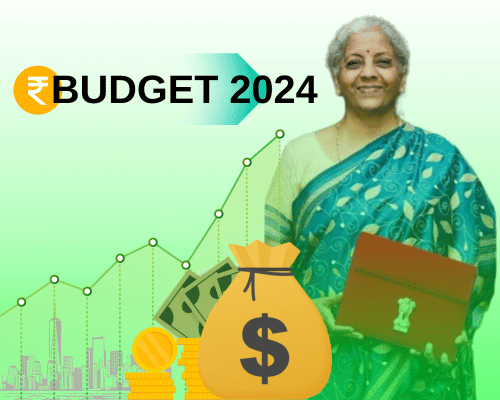Finance Minister Nirmala Sitharaman unveiled the Union Budget 2024 on Tuesday, July 23, presenting a plan to accelerate India’s transition to clean energy. The budget outlines policy measures and financial investments aimed at shifting the country towards renewable energy sources, marking a crucial step in India’s commitment to energy security and environmental protection.
For the fiscal year 2024-2025, the central government has allocated ₹3,330.37 crore to the Ministry of Environment, Forest, and Climate Change. This represents a notable increase from the previous year’s allocation of ₹3,079.40 crore and reflects a continued prioritization of environmental issues.
Climate Finance Taxonomy
One notable announcement in the budget speech was the development of a climate finance taxonomy to enhance capital availability for climate projects, supporting the country’s climate commitments and green transition. The taxonomy is expected to boost the green bond market and fund sectors like renewable energy, battery storage, and other sustainable technologies.
ALSO READ – Climate change drives rising food inflation in India
Crisil, a leading analytics firm, highlighted the significance of this move, stating that it will make it easier for companies to raise capital at preferential rates for funding green projects. This step is crucial in mobilizing the investments needed to achieve India’s clean energy goals.
Targeting Hard-to-Abate Industries
The Finance Minister announced plans to transition hard-to-abate industries from energy efficiency targets to emission-based ones. These industries will move from ‘Perform, Achieve and Trade’ regulations to carbon markets. This shift is expected to drive investments in sustainable technologies and lay the groundwork for a robust carbon market in India.
According to Crisil, this is a “seminal step towards de-carbonisation” that will push industries to adopt cleaner technologies and practices.
Recognizing the challenges of renewable energy sources like solar and wind, the government plans to promote pumped hydro storage projects. This initiative aims to address the round-the-clock availability of renewable energy, a critical factor in the large-scale adoption of clean power.
The forthcoming policy on pumped storage projects has been welcomed by industry leaders. Sumant Sinha, Founder, Chairman & CEO of ReNew, stated that this policy, along with the document on India’s energy transition pathway, will provide “much needed long-term clarity for investments across the value chain.”
PM Surya Ghar Muft Bijli Yojana: Powering Homes with Solar
The PM Surya Ghar Muft Bijli Yojana, an ambitious initiative in the budget, aims to install rooftop solar panels in 10 million households, providing 300 units of free electricity monthly. The program has received an overwhelming response, with 1.28 crore registrations recorded.
Industry leaders have praised this initiative for its potential to make solar energy more accessible to homes and increase the adoption of renewable energy. Sameer Gupta, Chairman & Managing Director of Jakson Group, described the scheme as “transformative in making sustainable energy accessible,” adding that it will boost solar adoption in the residential sector and drive economic growth.
ALSO READ – Study finds CdTe solar technology least harmful to environment in India
The budget includes measures to support the domestic solar manufacturing industry. The government has proposed to expand the list of exempted capital goods used in the manufacture of solar cells and panels, expected to reduce production costs and make Indian solar products more competitive globally.
Gyanesh Chaudhary, CMD of Vikram Solar Limited, welcomed the initiative, stating that it will lay “a robust foundation for India’s energy transition.”
Nuclear Energy and Small Modular Reactors
In a significant development for India’s energy mix, the budget emphasized the role of nuclear energy and announced support for small modular reactors, aligning with the global trend towards flexible and scalable nuclear energy solutions.
Dr. Ranjeet Mehta, Executive Director at PHDCCI, emphasized the significance of this support in achieving energy independence and climate sustainability, alongside the government’s focus on renewable energy sources.
Recognizing the importance of critical minerals in the clean energy transition, the budget announced full exemption for 25 critical minerals and reduced Basic Customs Duty (BCD) on two. This move is expected to boost the processing and refining of these minerals, securing their availability for the renewable energy sector.
Rahul Walawalkar, President of India Energy Storage Alliance (IESA), praised the initiative, stating that it will strengthen India’s position as a global renewable energy hub.
Skilling and Employment in the Clean Energy Sector
The budget addressed human resources in the clean energy transition by announcing plans to upskill 20 lakh youth over 5 years and upgrade 1,000 Industrial Training Institutes. This focus on skill development is expected to create a workforce capable of efficiently executing renewable energy projects, reducing cost and time overruns.
The budget has received positive reactions from industry leaders. Amit Jain, Global Chief Executive Officer of Sterling and Wilson Renewable Energy Group, called it “an acknowledgement of the industry’s potential in meeting India’s sustainability commitments.”
Udit Garg, CEO & Director of Kundan Green Energy, expressed optimism about the budget’s impact on the green energy sector, highlighting the rooftop solar policy and pumped storage initiatives.
Arif Iqbal Aga, Director of SgurrEnergy India, emphasized the potential of the PM Surya Yojana to alleviate grid burdens and empower households, stressing the importance of effective execution and regulatory support.
The budget has been welcomed by the industry, but challenges remain. SK Gupta, CFO of AMPIN Energy Transition, called for amendments to address demands like lower GST rates for renewable energy components and enhanced support for in-house R&D.
Follow Climate India for more Environmental News. Connect with us on Facebook, Twitter, Instagram, and YouTube




